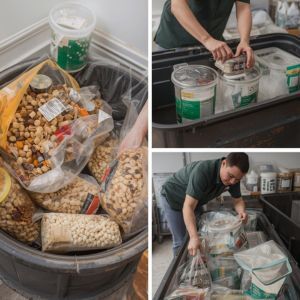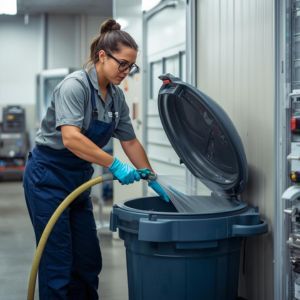How to Clean and Maintain Your Food Grade Bins Safely
In any commercial kitchen or food-handling business, maintaining hygiene is more than a best practice—it’s a legal and operational necessity. One key piece of the hygiene puzzle is the proper care of your food grade storage bins. Even the highest quality, certified food-grade bins can become a source of contamination if not cleaned and maintained correctly. This guide explains how to keep your bins safe, hygienic, and fully compliant with New Zealand’s food safety standards.
Why proper cleaning of food grade bins matters
Dirty or improperly cleaned bins can harbour bacteria, allergens, mould, and food residue, creating a serious risk of cross-contamination. According to a 2020 report by the World Health Organization, foodborne illnesses affect an estimated 600 million people globally each year, with contaminated food contact surfaces—including storage bins—being a major contributor. This isn’t just bad for business—it could also breach the Food Act 2014 and lead to enforcement action or reputational damage.
Food-grade bins are typically used to store dry goods, fresh produce, chilled items, or bulk ingredients—many of which are sensitive to contamination. Maintaining their cleanliness directly impacts your kitchen’s food safety, efficiency, and waste levels.
If you're still considering whether food-grade bins are essential for your setup, our detailed article Why Every Commercial Kitchen in NZ Needs Food-Grade Storage Bins breaks down the operational and safety benefits of investing in the right storage solution.
Step-by-step: How to clean food grade storage bins
1. Empty and inspect
Start by emptying the bin completely. Check for any leftover debris, mould, or discolouration that might signal the need for more intensive cleaning.
2. Use a food-safe cleaner
Always use a food-safe, non-toxic detergent approved for use in commercial kitchens. Avoid harsh chemicals like bleach unless they are specifically designated safe for food contact surfaces.
3. Scrub thoroughly with appropriate tools
Use a scrubbing brush or pad suitable for the bin’s material (plastic or stainless steel). Make sure to get into all corners, crevices and seams.
4. Rinse with hot potable water
Rinse with hot water (above 60°C if possible) to remove detergent and residues. Avoid using high-pressure hoses if the bin material is soft plastic, as this can damage the surface.
5. Sanitise
Apply a commercial-grade sanitiser that complies with MPI-approved guidelines. Allow the sanitiser to sit for the recommended contact time to ensure pathogens are killed.
6. Air dry completely
Always let bins air dry thoroughly before reuse. This prevents moisture-related mould or bacterial growth. Avoid using towels or cloths, which can reintroduce contamination.
How often should you clean food grade bins?
Cleaning frequency depends on how the bin is used:
-
Daily: For bins storing moist, perishable, or high-risk foods.
-
Weekly: For dry goods or infrequently accessed ingredients.
-
Immediately: If a spill, contamination, or strong odour occurs.
Regular inspections should be scheduled as part of your kitchen’s food safety plan, in accordance with your Food Control Plan (FCP) under MPI guidelines.
Maintenance tips to extend bin lifespan
-
Avoid dragging bins across rough floors.
-
Store in dry, ventilated areas.
-
Label bins clearly to prevent misuse.
-
Inspect for cracks or signs of wear that can harbour bacteria.
-
Replace lids or damaged parts promptly.
Common mistakes to avoid
-
Using abrasive cleaners that damage bin surfaces.
-
Skipping the sanitising step.
-
Stacking wet bins, which traps moisture.
-
Ignoring seals, wheels, or bin bases during cleaning.
Final thoughts: Keep your hygiene standards high
Clean bins are non-negotiable in every commercial kitchen. Not only does proper cleaning extend the life of your investment, but it also upholds your reputation and compliance. At Insinc, we offer a range of food-grade bins that are easy to clean, built for heavy-duty use, and compliant with New Zealand food safety standards.
Need help choosing the right bin or cleaning product? Get in touch with our team today.
Posted: Monday 20 October 2025


